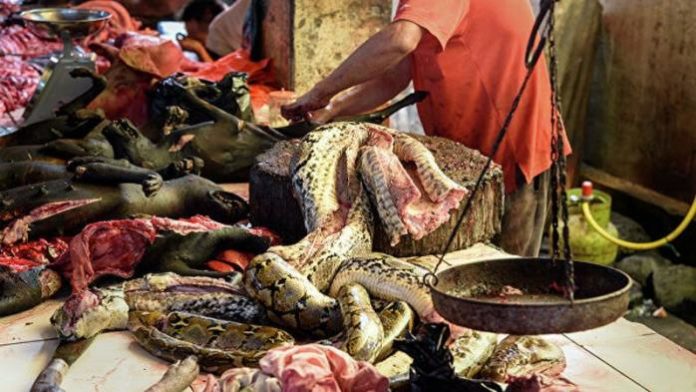New Delhi (NVI): Consumption of bushmeat could push the world towards more global pandemics such as the Covid-19, due to the risk of catching zoonotic diseases, warns Ben Garrod, an evolutionary biologist.
Bushmeat is a catchall phrase for the meat of wild animals, but it most often refers to the remains of animals killed in the forests and savannas of Africa.
People in Africa have hunted bats, monkeys, rats, snakes, and other wild animals for sustenance, for a long time. The meat, whether smoked, dried, or cooked, provides a valuable source of protein for people in rural communities where farming domesticated animals is too expensive or impractical. Hunting and selling bushmeat can also serve as an important source of income.
Notably, some of the world’s most deadly diseases, such as HIV, SARs, MERs, Ebola all have emerged from other species, including the novel coronavirus.
Zoonotic diseases are infectious diseases that originate in non-human animals and can be passed on to humans, resulting in chain transmissions.
In 2015, the World Health Organization (WHO) compiled a list of emerging diseases, which are “likely to cause severe outbreaks in the near future”. For decades, researchers have been investigating it and public health NGOs have been trying to prepare for such outbreaks.
Each disease on that ominous list is “zoonotic”, meaning they originate in non-human animals but either have the potential to jump from them to us or have already done so, Garrod was quoted as saying in a report jointly published by The Conversation and World Economic Forum (WEF).
The WHO further states that zoonoses account for not only 60% of diseases found in humans but represent 75% of all emerging infectious diseases.
It should be noted that the study of such zoonotic pathogens is rarely straightforward and investigating even relatively simple aspects of these diseases can require costly, time-consuming and complex epidemiology.
The search for the original source of Ebola, for example, began back in the 1990s. Yet despite a team successfully identifying in 2018 that the greater long-fingered bat is an important vector for the strain known as Ebola Zaire, scientists are still not certain whether these bats actually are the original hosts for the disease.
The possibility of a ban on bushmeat becomes much more difficult, however, when this wild meat is shipped either nationally or internationally.
While this most recent coronavirus originated in Wuhan, China, the illegal global trade makes it equally possible that the next global pandemic could start in Washington or Westminster, according to Ben Garrod.
In 2010, research conducted at Charles de Gaulle airport in Paris concluded that more than five tonnes of illegal meat arrived at this one airport each week, a staggering 270 tonnes annually.
In another study, JFK airport in New York found that over a four-year period, meat from green monkeys, mangabeys, baboons and even chimpanzees was confiscated, some of which was later identified to be harbouring zoonoses with the potential to infect humans.
This is a hugely complex problem. Researchers and government agencies must work alongside traders and consumers to better understand why people want bushmeat and educate those at greatest risk from eating infected meat.
Social and cultural sensitivity is paramount, but clear breaches of the law need to be enforced if we are to help stop the emergence of the next global zoonotic pandemic.








